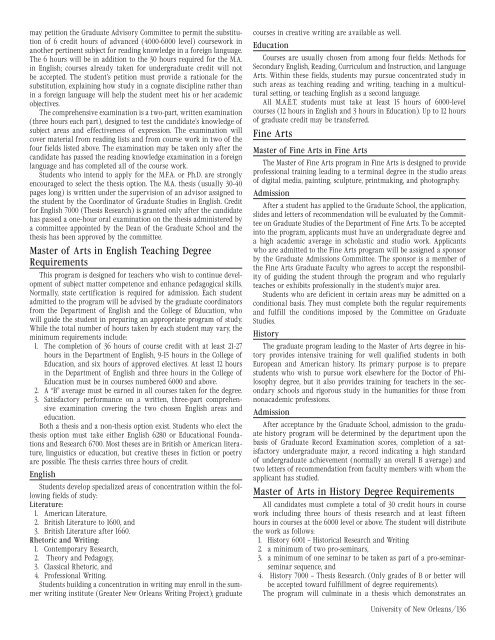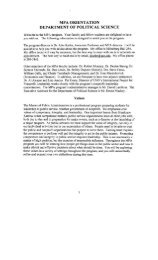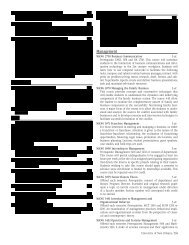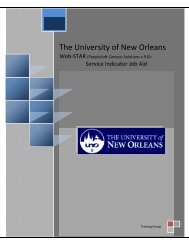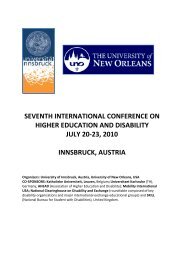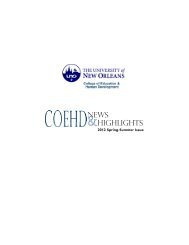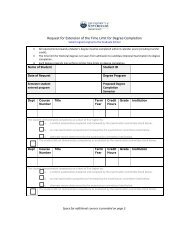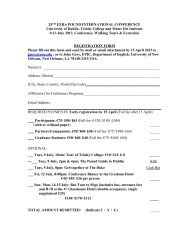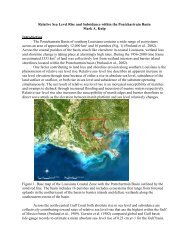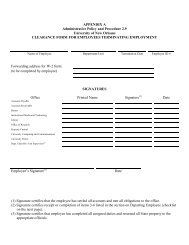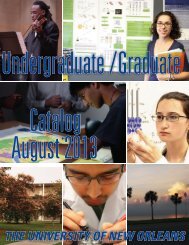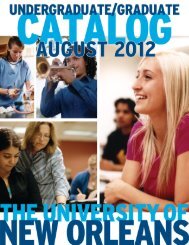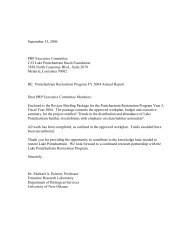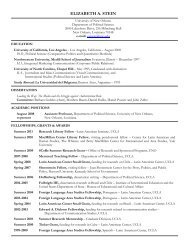Untitled - University of New Orleans
Untitled - University of New Orleans
Untitled - University of New Orleans
Create successful ePaper yourself
Turn your PDF publications into a flip-book with our unique Google optimized e-Paper software.
may petition the Graduate Advisory Committee to permit the substitution<br />
<strong>of</strong> 6 credit hours <strong>of</strong> advanced (4000-6000 level) coursework in<br />
another pertinent subject for reading knowledge in a foreign language.<br />
The 6 hours will be in addition to the 30 hours required for the M.A.<br />
in English; courses already taken for undergraduate credit will not<br />
be accepted. The student’s petition must provide a rationale for the<br />
substitution, explaining how study in a cognate discipline rather than<br />
in a foreign language will help the student meet his or her academic<br />
objectives.<br />
The comprehensive examination is a two-part, written examination<br />
(three hours each part), designed to test the candidate’s knowledge <strong>of</strong><br />
subject areas and effectiveness <strong>of</strong> expression. The examination will<br />
cover material from reading lists and from course work in two <strong>of</strong> the<br />
four fields listed above. The examination may be taken only after the<br />
candidate has passed the reading knowledge examination in a foreign<br />
language and has completed all <strong>of</strong> the course work.<br />
Students who intend to apply for the M.F.A. or Ph.D. are strongly<br />
encouraged to select the thesis option. The M.A. thesis (usually 30-40<br />
pages long) is written under the supervision <strong>of</strong> an advisor assigned to<br />
the student by the Coordinator <strong>of</strong> Graduate Studies in English. Credit<br />
for English 7000 (Thesis Research) is granted only after the candidate<br />
has passed a one-hour oral examination on the thesis administered by<br />
a committee appointed by the Dean <strong>of</strong> the Graduate School and the<br />
thesis has been approved by the committee.<br />
Master <strong>of</strong> Arts in English Teaching Degree<br />
Requirements<br />
This program is designed for teachers who wish to continue development<br />
<strong>of</strong> subject matter competence and enhance pedagogical skills.<br />
Normally, state certification is required for admission. Each student<br />
admitted to the program will be advised by the graduate coordinators<br />
from the Department <strong>of</strong> English and the College <strong>of</strong> Education, who<br />
will guide the student in preparing an appropriate program <strong>of</strong> study.<br />
While the total number <strong>of</strong> hours taken by each student may vary, the<br />
minimum requirements include:<br />
1. The completion <strong>of</strong> 36 hours <strong>of</strong> course credit with at least 21-27<br />
hours in the Department <strong>of</strong> English, 9-15 hours in the College <strong>of</strong><br />
Education, and six hours <strong>of</strong> approved electives. At least 12 hours<br />
in the Department <strong>of</strong> English and three hours in the College <strong>of</strong><br />
Education must be in courses numbered 6000 and above.<br />
2. A “B” average must be earned in all courses taken for the degree.<br />
3. Satisfactory performance on a written, three-part comprehensive<br />
examination covering the two chosen English areas and<br />
education.<br />
Both a thesis and a non-thesis option exist. Students who elect the<br />
thesis option must take either English 6280 or Educational Foundations<br />
and Research 6700. Most theses are in British or American literature,<br />
linguistics or education, but creative theses in fiction or poetry<br />
are possible. The thesis carries three hours <strong>of</strong> credit.<br />
English<br />
Students develop specialized areas <strong>of</strong> concentration within the following<br />
fields <strong>of</strong> study:<br />
Literature:<br />
1. American Literature,<br />
2. British Literature to 1600, and<br />
3. British Literature after 1660.<br />
Rhetoric and Writing:<br />
1. Contemporary Research,<br />
2. Theory and Pedagogy,<br />
3. Classical Rhetoric, and<br />
4. Pr<strong>of</strong>essional Writing.<br />
Students building a concentration in writing may enroll in the summer<br />
writing institute (Greater <strong>New</strong> <strong>Orleans</strong> Writing Project); graduate<br />
courses in creative writing are available as well.<br />
Education<br />
Courses are usually chosen from among four fields: Methods for<br />
Secondary English, Reading, Curriculum and Instruction, and Language<br />
Arts. Within these fields, students may pursue concentrated study in<br />
such areas as teaching reading and writing, teaching in a multicultural<br />
setting, or teaching English as a second language.<br />
All M.A.E.T. students must take at least 15 hours <strong>of</strong> 6000-level<br />
courses (12 hours in English and 3 hours in Education). Up to 12 hours<br />
<strong>of</strong> graduate credit may be transferred.<br />
Fine Arts<br />
Master <strong>of</strong> Fine Arts in Fine Arts<br />
The Master <strong>of</strong> Fine Arts program in Fine Arts is designed to provide<br />
pr<strong>of</strong>essional training leading to a terminal degree in the studio areas<br />
<strong>of</strong> digital media, painting, sculpture, printmaking, and photography.<br />
Admission<br />
After a student has applied to the Graduate School, the application,<br />
slides and letters <strong>of</strong> recommendation will be evaluated by the Committee<br />
on Graduate Studies <strong>of</strong> the Department <strong>of</strong> Fine Arts. To be accepted<br />
into the program, applicants must have an undergraduate degree and<br />
a high academic average in scholastic and studio work. Applicants<br />
who are admitted to the Fine Arts program will be assigned a sponsor<br />
by the Graduate Admissions Committee. The sponsor is a member <strong>of</strong><br />
the Fine Arts Graduate Faculty who agrees to accept the responsibility<br />
<strong>of</strong> guiding the student through the program and who regularly<br />
teaches or exhibits pr<strong>of</strong>essionally in the student’s major area.<br />
Students who are deficient in certain areas may be admitted on a<br />
conditional basis. They must complete both the regular requirements<br />
and fulfill the conditions imposed by the Committee on Graduate<br />
Studies.<br />
History<br />
The graduate program leading to the Master <strong>of</strong> Arts degree in history<br />
provides intensive training for well qualified students in both<br />
European and American history. Its primary purpose is to prepare<br />
students who wish to pursue work elsewhere for the Doctor <strong>of</strong> Philosophy<br />
degree, but it also provides training for teachers in the secondary<br />
schools and rigorous study in the humanities for those from<br />
nonacademic pr<strong>of</strong>essions.<br />
Admission<br />
After acceptance by the Graduate School, admission to the graduate<br />
history program will be determined by the department upon the<br />
basis <strong>of</strong> Graduate Record Examination scores, completion <strong>of</strong> a satisfactory<br />
undergraduate major, a record indicating a high standard<br />
<strong>of</strong> undergraduate achievement (normally an overall B average) and<br />
two letters <strong>of</strong> recommendation from faculty members with whom the<br />
applicant has studied.<br />
Master <strong>of</strong> Arts in History Degree Requirements<br />
All candidates must complete a total <strong>of</strong> 30 credit hours in course<br />
work including three hours <strong>of</strong> thesis research and at least fifteen<br />
hours in courses at the 6000 level or above. The student will distribute<br />
the work as follows:<br />
1. History 6001 – Historical Research and Writing<br />
2. a minimum <strong>of</strong> two pro-seminars,<br />
3. a minimum <strong>of</strong> one seminar to be taken as part <strong>of</strong> a pro-seminarseminar<br />
sequence, and<br />
4. History 7000 – Thesis Research. (Only grades <strong>of</strong> B or better will<br />
be accepted toward fulfillment <strong>of</strong> degree requirements).<br />
The program will culminate in a thesis which demonstrates an<br />
<strong>University</strong> <strong>of</strong> <strong>New</strong> <strong>Orleans</strong>/136


